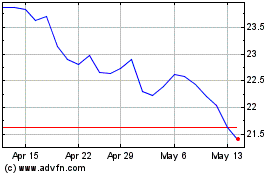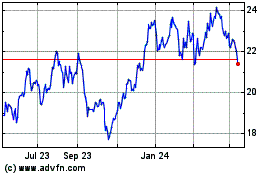Australian Steelmaker Mulls $700 Million U.S. Investment -- Update
13 August 2018 - 11:45AM
Dow Jones News
By David Winning
SYDNEY--An Australian steelmaker is planning an up to US$700
million investment in the U.S., in the latest example of companies
expanding production or restarting idle mills to make up for
imports being priced out of the market in the wake of President
Donald Trump's import tariffs.
BlueScope Steel Ltd. said it is considering adding at least
600,000 to 900,000 metric tons of new steelmaking capacity at its
North Star business in the U.S., which has become a major engine of
profits at a company that for several years was focused on feeding
Asia's infrastructure boom.
Management said construction at the facility in Delta, Ohio,
would likely take up to three years and deliver a more than 40%
increase in steelmaking production capacity. North Star sells
nearly all its steel to customers in the U.S. Midwest, especially
automotive and construction companies.
"The project under evaluation involves the addition of a third
electric arc furnace and second slab caster," said Chief Executive
Mark Vassella. The project, currently in the study phase, was
outlined alongside a more than doubling in BlueScope's annual
profit to US$1.14 billion, increased dividend and expanded share
buyback program.
BlueScope's investment follows moves by other companies to
expand production, as profit margins on U.S. steel remain high.
Prices of Midwest hot-rolled coil were recently up around 40% on
year.
Many U.S. producers believe a 25% tariff imposed on steel from
many foreign countries, announced by Mr. Trump in March and
effective from the start of June, could give them the price
advantage they have lobbied for in recent years. Still, shortages
of domestic steel, coupled with rapidly rising prices, could
attract imports to the market even with tariffs.
In March, United States Steel Corp. said it would fire up a
blast furnace in Granite City, Ill., and call back 500 workers.
That marked a big swing in strategy for a company that had idled
the furnaces and laid off hundreds of workers in 2015 as a flood of
cheap imports pushed down domestic prices.
BlueScope has been widely seen as a winner from escalating
U.S.-China trade frictions because the company doubled down on the
U.S. in recent years, just as American producers were cutting
production amid a global glut. Big foreign rivals such as Germany's
Thyssenkrupp AG and Russia's OAO Severstal also cut back or
jettisoned U.S. operations.
For BlueScope, ramping up in the U.S. was part of a strategy
plotted in 2007 to diversify from its home market. Since then, the
steelmaker has continued to predict a strong outlook for American
steel demand, driven by construction and autos.
With acquisitions over the past decade or so, BlueScope has
roughly US$3 billion of steelmaking assets across 12 states. The
expansion included the 2007 purchase of IMSA Steel Corp. from
Ternium SA for US$730 million and a 2015 buyout of its 50% partner
in North Star, Cargill Inc., for US$720 million. That site is the
fifth largest producer of hot-rolled coil in North America by
volume.
BlueScope also exports more than US$200 million of metal to the
U.S. each year, mainly from its Port Kembla steelworks south of
Sydney.
Write to David Winning at david.winning@wsj.com
(END) Dow Jones Newswires
August 12, 2018 21:30 ET (01:30 GMT)
Copyright (c) 2018 Dow Jones & Company, Inc.
Bluescope Steel (ASX:BSL)
Historical Stock Chart
From Jan 2025 to Feb 2025

Bluescope Steel (ASX:BSL)
Historical Stock Chart
From Feb 2024 to Feb 2025
